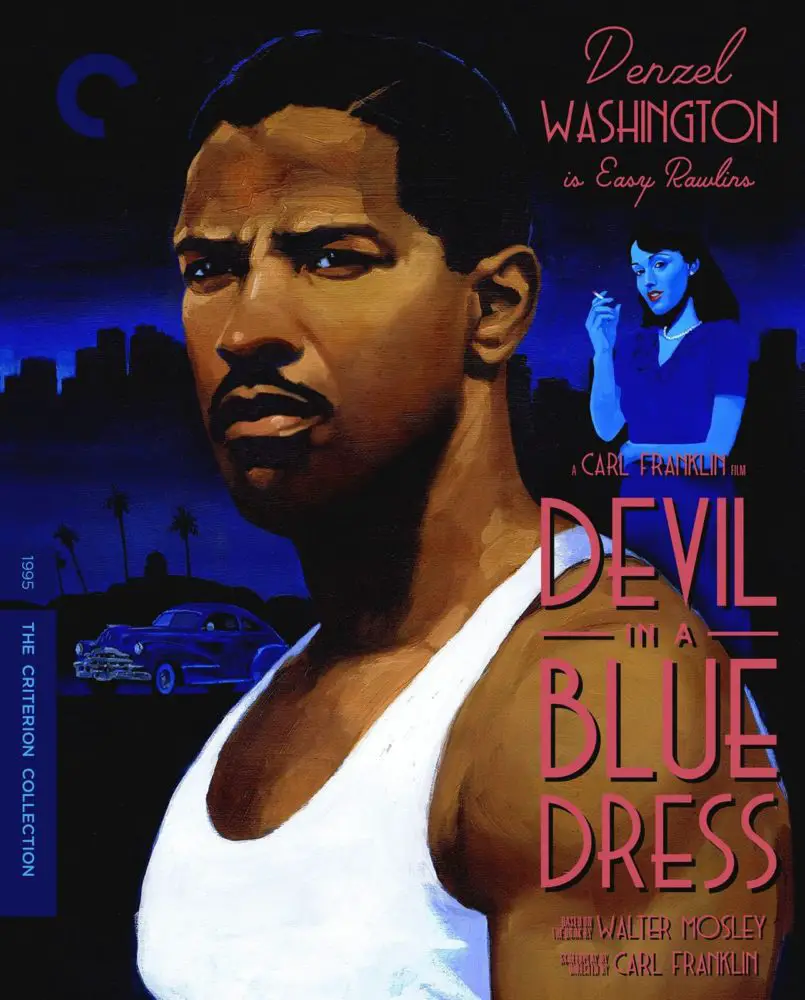Since the George Floyd worldwide protests of 2020, the Criterion Collection has been making some redoubled efforts to highlight the artistry of African American directors, writers, stars, and their narratives. For a canon that’s always leaned towards the European, the white, the male, and the classical in film history, the effort is both welcome and overdue.
First, Criterion made dozens of its films freely available; then, over the past two years, Criterion’s new releases have included a wealth of African American voices, from standalone editions of Charles Burnett’s To Sleep with Anger, Gordon Parks’ The Learning Tree and Shaft, Hughes brothers’ Menace II Society, Bill Duke’s Deep Cover, Spike Lee’s Bamboozled, Gina Prince-Bythewood’s Love and Basketball, Garrett Bradley’s Time, and Regina King’s One Night in Miami, as well as box sets collecting the work of Marlon Riggs and Melvin Van Peebles. The newest spine number in the collection, #1135, is a 4k remastering of the long-neglected Devil in a Blue Dress, Carl Franklin’s L.A. noir starring Denzel Washington, a film highly worthy of the “Criterion treatment.”

Released in 1995 and adapted from the Walter Mosley novel of the same name—the first of what now number 15 to feature the aviation mechanic-turned-private investigator “Easy” Rawlins—Devil in a Blue Dress seemed poised for success. Its star was the Oscar-winning soon-to-be “Sexiest Man Alive,” the novel a perfect vehicle for exploring the racial tensions of postwar L.A., and neo-noir and black-themed narratives both at the time enjoying box-office vitality. Aside from Washington’s smoldering performance and Franklin’s adroit period-piece direction (including stellar wardrobe work from Sharen Davis and cinematography from Tak Fujimoto), the film also featured a sensational supporting performance from a young Don Cheadle as the volatile, unpredictable Mouse.
Sadly, the film underperformed at the box office—perhaps in part due to the attention drawn to the O.J. Simpson not-guilty verdict its second weekend of release—and faded into a relative obscurity, failing to earn back its $22m budget. It’s been released on physical media before, with a thoughtful director’s commentary track, on DVD and Laserdisc and, a few years back, on a hard-to-find boutique blu-ray, but never, until now, the subject of any restoration, much less the Criterion cinephile treatment. So, spine #1135 is a welcome addition indeed.
The Film
Last fall, I published a lengthy analysis of Devil in A Blue Dress here on 25YL/Film Obsessive, focusing on the film’s adaptation of Mosley’s novel, its neo-noir aesthetic, Washington’s performance, and the racial tensions exacerbated by the film’s central mystery: the racial passing of the character of Daphne Monet, the film’s literal “devil in a blue dress,” and the casting of Jennifer Beals in the role. Feel free to take a look there for my more detailed comments on the film’s contexts, narrative, themes, and reception.
Here, Criterion presents the film in a new 4K digital restoration, approved by Franklin, with a 5.1 surround DTS-HD Master Audio soundtrack, on two discs. The 4K UHD disc is is presented in Dolby Vision HDR; the Blu-ray includes the film and the special features listed below. Both discs offer the Carl Franklin audio commentary recorded in 1998 for the laserdisc version of the film and that has routinely been included on the film’s prior physical media releases.
The film is gorgeous. While the film has never looked bad, even on DVD or streaming, the 4K release brings out the film’s subtly shaded color palette with detail. Perhaps the finest details can be be seen in the film’s few exterior and daylight scenes, where Fujimoto’s detailed street scenes lovingly recreate a postwar Los Angeles with a focus on social realism as Easy Rawlins’ investigation takes him through juke joints and tony mansions. Comparing the 4K and Blu ray discs, there is little obvious contrast between the two I can note on my mid-level system, but the 4K does seem to offer slightly deeper blackness in the many nighttime scenes as well as a slightly more accurate rendition of the film’s muted colors. Those viewers hoping to save a few dollars by purchasing the single-disc Blu ray are not likely to be disappointed.
Devil in a Blue Dress is a film that is absolutely worth watching. It may not have captured the public imagination the way other African American features or neo-noir narratives of the era have, and some of Franklin’s choices in casting and adaptation, while certainly defensible, don’t necessarily make for a more invigorating experience. But its depiction of an era just beginning to build its vast middle class—and segregate it from the upper and lower strata it bordered—is convincing, and Washington and Cheadle smolder and crackle in two distinctly contrasting roles.
Special Features
- Audio commentary featuring director Carl Franklin, recorded in 1998. This audio track is one likely familiar to any owner of any of the film’s prior physical media releases, which is not to say it’s not an excellent commentary track. Franklin describes and in some cases defends his choices regarding the adaptation of Mosley’s novel and the casting of Beals as Monet. He also provides a few choice anecdotes from the production: Washington, for instance, had a private gym installed on set and arrived early each day to work out, knowing he’d spend a good portion of the shoot in his undershirt. While I’m happy to see—or hear—this excellent commentary track included, I’d also have loved to get something new alongside it. Perhaps a roundtable between Franklin and the others interviewed (Cheadle, Mosley, novelist-screenwriter Attica Locke) or other participants (especially Beales and Washington); or, alternatively, a more scholarly commentary track from any of the number of excellent film scholars whose specialty is African American cinema. The film’s racial politics—it is consumed, even obsessed with a mystery woman’s “true” racial identity—are complex, and some of Franklin’s choices in rewriting Mosley make it even more so. Here is one place I wish Criterion could have taken their efforts just one step further and supplemented a decades-old commentary track with something newer and from a more collaborative or scholarly perspective.
- Carl Franklin and Don Cheadle. One of three features new to this version of the disc is this handsomely staged, shot, and edited conversation between director and supporting actor. The two are seated in a covid-distanced arrangement that looks a bit awkward but is nonetheless thankfully far more pleasant than the ubiquitous Zoom-interface interviews that appeared on other discs made during the height of the pandemic. Cheadle is his typical affable, engaged self and the two enjoy a wide-ranging discussion, reaching back to the history of black cinema through the Blaxploitation movement and the influence of Spike Lee. While Cheadle is obviously not the star of the film nor the icon Denzel Washington has become, his is a welcome contribution to the discourse on Devil in a Blue Dress.
- Walter Mosley and Attica Locke. Novelist and screenwriter Locke leads an enthusiastic discussion with novelist Mosley, stretching back to the origins of the Easy Rawlins character, the composition of Devil in a Blue Dress, the detective’s subsequent appearances in the series of novels that followed, and the sadly-aborted plans for a film franchise. Locke is ebullient, Mosley forthright, and the discussion wide-ranging and enjoyable, even in discussion of changes Franklin made to Mosley’s plot.
- Noir City Chicago: Carl Franklin and Eddie Muller. Recorded onstage at the 2018 Noir City Film Festival in Chicago, this pre- and post-screening conversation between the director and film historian Muller is—for a live event—handsomely shot and carefully recorded, as well as tightly edited for time and interspersed with film stills, clips, and poster images. Even the audience questions—or at least those selected for inclusion—are excellent, speaking to some of Franklin’s directorial decisions.
- Et Cetera. Regrettably, none of the above new-to-disc featurettes include subtitles. Nor does the 14-minute screen test for Don Cheadle, which is an enjoyable watch as the actor slips in and out of character. Also included is the film’s original theatrical trailer.
The Package
- The two-disc edition is ensconced in a single clear jewel case, as is Criterion’s now-normal practice, with nothing indicating its 4K UHD + Blu-Ray status other than a single note on its back cover. A new cover by James Ransome foregrounds Washington in his signature undershirt, with a smaller image of a blue-tinted Beals with a cigarette, in pearls, and of course, a blue dress. It’s a significant improvement from the rather silly and inaccurate neon-noir poster gracing the earlier DVD cover.
- A handsome foldout lists cast and crew alongside a baker’s-dozen stills from the film and Julian Kimble’s essay, “Crossing the Line,” which addresses the film’s source novel, director, preproduction, style, and themes. Concise and unambiguous, it begins: “The American Dream has always been a spectacular lie.”
The Criterion Collection is working to expand and diversify its canon of “the greatest films from around the world” by including more works from African American stars, directors, and writers, and Devil in a Blue Dress is an important, if flawed, film, one that directly addresses the racial caste system inherent in postwar America. Its adoption of the noir idiom, filtered through a classical approach to cinematography and told from the perspective of a Black man who has become an unwilling detective, asks viewers to confront the politics of race and sex in film noir specifically and postwar America more generally. While Criterion’s treatment might have gone even one step farther in addressing the film’s complex themes, this package’s combination of an excellent remastering and new interview content make it a welcome, even necessary, inclusion in its expanding collection.



